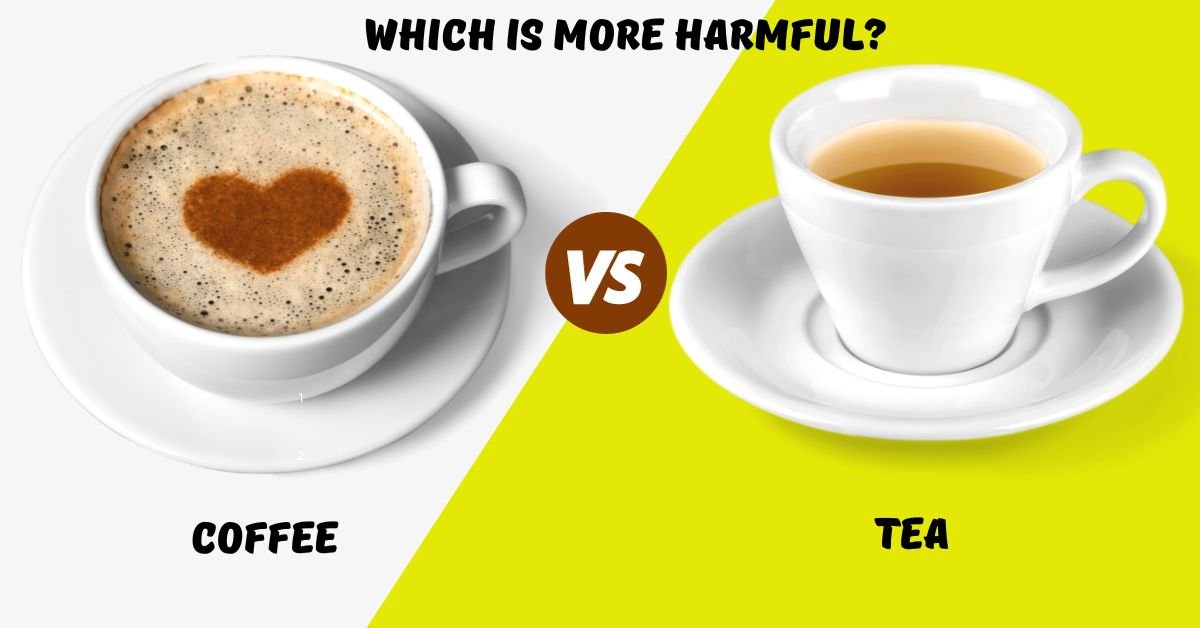Which is more Harmful Tea or Coffee? (2023 Guidelines)

In the world of beverages, the debate between coffee and tea has long been a topic of discussion. Both have their dedicated enthusiasts, each proclaiming the virtues of their preferred brew.
While tea boasts an impressive array of health benefits, with its antioxidant-rich properties often in the spotlight, coffee loyalists argue that its stimulating kick-start to the day is unparalleled.
However, amidst the praise for their individual merits, a lingering question often arises: “Which is more harmful tea or coffee?“
In this exploration, we will delve into the complexities of this query, assessing the potential downsides of both tea and coffee, shedding light on their respective health benefits, and helping you make an informed choice in your daily beverage selection.
So, as we sip our tea and coffee, let’s navigate the nuanced terrain of tea and coffee consumption, seeking to understand the balance between their perceived harms and benefits.

Tea vs. Coffee
Tea and coffee are two of the world’s most popular beverages, each with its own unique flavors, brewing methods, and cultural significance. Let’s compare these two beloved drinks in various aspects:
1. Caffeine Content:
- Coffee: Coffee is generally known for its higher caffeine content compared to tea. An 8-ounce (240-milliliter) cup of coffee can contain around 95-165 milligrams of caffeine, depending on factors like the type of beans and brewing method.
- Tea: Tea contains less caffeine than coffee. An 8-ounce cup of black tea typically has about 40-70 milligrams of caffeine, while green tea contains around 20-45 milligrams. Herbal teas, like chamomile, are naturally caffeine-free.
2. Flavor and Aroma:
- Coffee: Coffee is famous for its rich, bold, and often complex flavors. The taste can vary widely based on the bean’s origin, roast level, and brewing method. Common coffee flavor notes include nutty, chocolatey, fruity, or earthy undertones.
- Tea: Tea offers a diverse range of flavors, from the brisk and malty taste of black tea to the delicate and floral notes of green and white teas. The flavor can be influenced by the type of tea leaves, processing methods, and brewing techniques.
3. Preparation:
- Coffee: Coffee preparation typically involves grinding roasted coffee beans and brewing them with hot water using methods like drip brewing, espresso, French press, or pour-over. The brewing time, grind size, and coffee-to-water ratio can be adjusted for customization.
- Tea: Making tea is as simple as steeping dried tea leaves in hot water. The brewing time and water temperature can significantly influence the flavor profile. For example, black tea is steeped for 3-5 minutes at a temperature of 200-212°F (93-100°C), while green tea is steeped for 2-3 minutes at 175-185°F (80-85°C).
4. Types and Varieties:
- Coffee: Coffee comes in various forms, including espresso, cappuccino, latte, and more. The coffee world is also rich in single-origin beans, allowing enthusiasts to explore different coffee regions and flavors.
- Tea: Tea enthusiasts can enjoy a wide variety of types, including black, green, white, oolong, and herbal teas. Each type has its own unique characteristics and flavor profiles, offering a diverse range of choices.
5. Cultural Significance:
- Coffee: Coffee has deep cultural roots in countries like Ethiopia, Yemen, and various Latin American and African nations. It’s often associated with social gatherings and rituals, such as the European coffeehouse tradition.
- Tea: Tea plays a central role in cultures like China, Japan, India, and the United Kingdom. It’s also a cornerstone of various ceremonies and traditions, such as the Japanese tea ceremony and British afternoon tea.
6. Health Benefits:
Both tea and coffee contain antioxidants, which can have potential health benefits when consumed in moderation. These benefits may include improved alertness, focus, and reduced risk of certain diseases. However, excessive caffeine consumption can lead to adverse effects, such as sleep disturbances and increased heart rate.
Ultimately, the choice between tea and coffee is a matter of personal preference. Some people prefer the boldness and immediate energy boost of coffee, while others appreciate the diverse flavors and potential health benefits of tea.
Many individuals enjoy both beverages for different occasions and reasons, allowing them to savor the best of both worlds. Whether you’re a coffee aficionado or a tea enthusiast, both beverages have a rich history and culture that can be explored and enjoyed.
Health Benefits of Tea
Tea is a beloved beverage enjoyed by millions around the world, and it offers a range of potential health benefits, largely attributed to its rich antioxidant content.
Antioxidants are compounds that help protect cells from damage caused by harmful molecules known as free radicals. Here are some of the health benefits associated with drinking tea, particularly those related to its antioxidant properties:

1. Rich in Antioxidants:
Polyphenols: Tea, especially green tea, black tea, white tea, and oolong tea, is rich in polyphenolic compounds like catechins, theaflavins, and flavonoids. These compounds have potent antioxidant properties that help combat oxidative stress in the body.
2. Cardiovascular Health:
Reduced Risk of Heart Disease: Regular tea consumption has been associated with a reduced risk of heart disease. The antioxidants in tea may help lower blood pressure, improve cholesterol levels, and enhance blood vessel function, all of which contribute to better cardiovascular health.
3. Improved Metabolic Health:
- Weight Management: Some studies suggest that the catechins in green tea can aid in weight management by promoting fat oxidation and increasing metabolic rate.
- Blood Sugar Control: Tea, particularly green tea, may help regulate blood sugar levels, which is beneficial for individuals at risk of type 2 diabetes.
4. Cognitive Benefits:
Enhanced Brain Function: The caffeine and L-theanine in tea can work together to improve cognitive function, attention, and alertness. They may also contribute to a calmer and more focused state of mind.
5. Reduced Risk of Certain Cancers:
Cancer Prevention: Tea, especially green tea, contains compounds that have been linked to a reduced risk of certain cancers, including breast, prostate, and colorectal cancer. The antioxidants in tea may help inhibit the growth of cancer cells and protect against DNA damage.
6. Skin Health:
Anti-Aging Effects: The antioxidants in tea, such as epigallocatechin gallate (EGCG), can help protect the skin from UV damage and premature aging. The topical application of tea extracts is also used in skincare products for their potential benefits.
7. Oral Health:
- Reduced Tooth Decay: Tea contains fluoride and tannins, which may help reduce the growth of bacteria in the mouth and decrease the risk of tooth decay.
- Gum Health: Some research suggests that the polyphenols in tea may have a positive impact on gum health and reduce the risk of periodontal diseases.
8. Digestive Health:
Digestive Aid: Herbal teas like peppermint and ginger tea can aid digestion, relieve gastrointestinal discomfort, and reduce symptoms of indigestion and nausea.
9. Stress Reduction:
Relaxation: The amino acid L-theanine found in tea, especially green tea, can promote relaxation and reduce stress and anxiety without causing drowsiness. It can also improve sleep quality.
10. Hydration:
Tea is an excellent source of hydration and can contribute to daily fluid intake without added calories or sugar.
It’s important to note that the specific health benefits of tea can vary depending on the type of tea, its preparation, and individual factors.
While tea can be a valuable addition to a healthy diet, it’s essential to consume it in moderation and as part of a well-balanced lifestyle.
Additionally, for individuals with specific health conditions or concerns, it’s advisable to consult with a healthcare professional or registered dietitian for personalized dietary recommendations.
Antioxidant Content in Tea
Antioxidants are compounds that help protect the body’s cells from damage caused by harmful molecules known as free radicals. Free radicals can contribute to various chronic diseases and accelerate the aging process.
Tea, in both black and green varieties, is renowned for its rich antioxidant content, making it a popular choice among health-conscious individuals. Here’s a closer look at the antioxidant content in tea:
1. Catechins:
Green Tea: Green tea is particularly abundant in catechins, a type of flavonoid antioxidant. The most potent catechin in green tea is epigallocatechin gallate (EGCG).
EGCG has been widely studied for its potential health benefits, including its role in protecting cells from oxidative damage.
2. Theaflavins and Thearubigins:
Black Tea: Black tea contains its own set of antioxidants, including theaflavins and thearubigins. These compounds develop during the fermentation process that black tea undergoes. While they are different from the catechins in green tea, they still have potent antioxidant properties.
3. Flavonoids:
Both Green and Black Tea: Tea, whether green or black, is rich in various flavonoids. Flavonoids are a group of polyphenolic compounds that have antioxidant, anti-inflammatory, and potential health-promoting effects. They contribute to the vibrant colors and flavors of tea.
4. Vitamins and Minerals:
Tea contains small amounts of vitamins and minerals: Including vitamins like vitamin C and vitamin E, as well as minerals like manganese, potassium, and zinc. These micronutrients work alongside antioxidants to support overall health and protect cells.
5. Combination of Antioxidants:
Synergistic Effects: One of the unique aspects of tea is that it contains a combination of different antioxidants. These antioxidants often work synergistically, enhancing each other’s effectiveness in neutralizing free radicals and preventing oxidative damage.
6. Variety of Tea Types:
Different Types of Tea: While green and black teas are the most commonly consumed, other teas, such as white tea and oolong tea, also contain antioxidants, albeit in varying amounts. The antioxidant profile can differ among these tea types due to differences in processing methods and the level of oxidation.
7. Herbal Teas:
Herbal teas: Herbal teas, like chamomile, peppermint, and rooibos, also provide antioxidants. These herbal infusions are caffeine-free and offer a wide range of flavors and potential health benefits.
8. Health Benefits:
Potential Health Effects: The antioxidant-rich nature of tea is associated with a variety of potential health benefits, including improved cardiovascular health, reduced risk of chronic diseases, such as cancer and diabetes, and enhanced skin health.
It’s important to note that the antioxidant content in tea can vary based on factors like tea variety, growing conditions, and brewing methods.
Generally, brewing tea for longer periods or using hotter water can extract more antioxidants from the leaves. However, over-brewing can also result in a bitter taste.
Incorporating tea into your daily routine can be a flavorful way to increase your antioxidant intake and support overall health.
Whether you prefer green, black, or herbal varieties, the diverse antioxidants in tea make it a versatile and enjoyable beverage with potential health-promoting properties.
Health Benefits of Coffee
Coffee, one of the world’s most widely consumed beverages, is known for its rich and complex flavor, as well as its potential health benefits.
Coffee is particularly notable for its antioxidant content, and these antioxidants contribute to a range of health advantages when consumed in moderation. Here are some of the potential health benefits of drinking coffee:

1. Antioxidant Protection:
Rich in Antioxidants: Coffee is a significant source of dietary antioxidants, including chlorogenic acid and caffeic acid. These compounds help combat oxidative stress and neutralize harmful free radicals in the body.
2. Improved Cognitive Function:
Enhanced Mental Alertness: Coffee is well-known for its caffeine content, which can improve alertness, concentration, and cognitive function. It can also reduce the perception of fatigue.
3. Mood Elevation:
Mood Enhancement: Coffee consumption has been linked to a reduced risk of depression and a lower risk of suicide. Caffeine may help elevate mood and increase the release of certain neurotransmitters, such as dopamine and serotonin.
4. Reduced Risk of Neurological Diseases:
Neuroprotection: Some studies suggest that regular coffee consumption is associated with a reduced risk of neurodegenerative diseases like Parkinson’s and Alzheimer’s. The antioxidants in coffee may help protect brain cells from damage.
5. Cardiovascular Health:
Heart Health: Moderate coffee consumption has been associated with a lower risk of heart disease. Coffee may help improve blood vessel function, reduce inflammation, and improve cholesterol profiles.
6. Reduced Risk of Type 2 Diabetes:
Diabetes Prevention: Regular coffee intake has been linked to a lower risk of type 2 diabetes. Caffeine and other compounds in coffee may enhance insulin sensitivity and glucose metabolism.
7. Physical Performance Enhancement:
Performance Booster: Caffeine in coffee is a popular ergogenic aid, known to enhance physical performance, endurance, and the release of adrenaline, which can be beneficial during exercise.
8. Liver Health:
Liver Protection: Coffee consumption has been associated with a lower risk of liver diseases, including fatty liver disease, cirrhosis, and liver cancer. The exact mechanisms are still under investigation but may involve the antioxidant properties of coffee.
9. Weight Management:
Appetite Control: Caffeine can suppress appetite and increase metabolism, potentially aiding in weight management. It may also stimulate thermogenesis, the production of heat in the body, which can burn calories.
10. Gastrointestinal Health:
Digestive Benefits: Coffee may have protective effects on the digestive system. It can stimulate gastric acid production, potentially aiding digestion. Some compounds in coffee, like chlorogenic acid, may also have prebiotic effects on gut microbiota.
11. Reduced Risk of Certain Cancers:
Cancer Prevention: Some studies suggest that coffee consumption may be associated with a reduced risk of certain cancers, including liver, colorectal, and endometrial cancers.
It’s important to emphasize that while moderate coffee consumption is generally considered safe for most adults, excessive intake can lead to adverse effects, including increased heart rate, anxiety, and sleep disturbances.
The ideal amount of coffee can vary from person to person, so it’s essential to find a balance that suits your individual tolerance and lifestyle.
Coffee’s potential health benefits are likely due to the combined effects of caffeine and the various antioxidants and bioactive compounds found in coffee beans.
To maximize the potential health benefits, it’s advisable to enjoy coffee in its purest form (without excessive sugar or cream) and as part of a balanced diet and healthy lifestyle.
If you have specific health concerns or medical conditions, consult with a healthcare professional for personalized dietary recommendations.
Caffeine Content
Caffeine is a natural stimulant found in various plants, and it’s commonly consumed in the form of tea and coffee. It’s one of the most widely consumed psychoactive substances globally and is known for its stimulating effects on the central nervous system. Here’s a breakdown of the caffeine content in tea and coffee:
Caffeine in Tea:
- Black Tea: Black tea is one of the most popular tea varieties, and it typically contains a moderate amount of caffeine. An 8-ounce (240-milliliter) cup of black tea contains approximately 40-70 milligrams of caffeine, although this can vary depending on factors such as the type of tea leaves, brewing time, and water temperature.
- Green Tea: Green tea generally contains less caffeine than black tea. An 8-ounce cup of green tea typically provides around 20-45 milligrams of caffeine. The lower caffeine content is due to the milder oxidation process that green tea leaves undergo.
- White Tea: White tea is the least processed of all tea types, and it contains the least amount of caffeine among traditional teas. A cup of white tea typically contains about 15-30 milligrams of caffeine.
- Herbal Teas: Many herbal teas, such as chamomile, peppermint, and rooibos, are naturally caffeine-free. However, some herbal teas, like yerba mate and guayusa, contain caffeine, though the levels can vary.
- Decaffeinated Tea: Decaffeinated teas are processed to remove most of the caffeine, but they still contain trace amounts. The exact caffeine content in decaffeinated tea can vary depending on the brand and processing method but is generally much lower than regular tea.
Caffeine in Coffee:
- Coffee: Coffee is well-known for its caffeine content. The amount of caffeine in a cup of coffee can vary widely based on factors like the type of coffee bean, brewing method, and serving size. On average, an 8-ounce (240-milliliter) cup of brewed coffee contains around 95-165 milligrams of caffeine. However, some specialty coffees, like espresso, can contain even higher caffeine concentrations.
- Instant Coffee: Instant coffee typically contains slightly less caffeine than brewed coffee. An 8-ounce cup of instant coffee usually provides about 63 milligrams of caffeine.
- Decaffeinated Coffee: Decaffeinated coffee is processed to remove most of the caffeine, but it’s not entirely caffeine-free. A cup of decaffeinated coffee may contain around 2-5 milligrams of caffeine, depending on the brand and preparation method.
Factors Influencing Caffeine Content:
Several factors can influence the caffeine content in tea and coffee:
- Brewing Time: The longer tea or coffee is steeped or brewed, the more caffeine it will contain.
- Brewing Temperature: Higher water temperatures tend to extract more caffeine from tea leaves or coffee grounds.
- Type and Variety: Different tea and coffee varieties contain varying amounts of caffeine.
- Serving Size: Larger servings will naturally have more caffeine than smaller ones.
- Processing Method: The processing method of tea leaves and coffee beans can affect caffeine content.
Individual Sensitivity:
It’s important to note that individuals have varying levels of sensitivity to caffeine. Some people can consume larger quantities of caffeine without experiencing adverse effects, while others may be more sensitive and experience symptoms like jitteriness, increased heart rate, and sleep disturbances with even small amounts of caffeine.
Considerations for Choosing Tea or Coffee
Choosing between tea and coffee often depends on personal preferences, caffeine tolerance, and specific health goals. Here are some considerations for deciding between the two beverages, taking into account energy levels, attention, and weight loss benefits:
1. Energy Levels and Attention:
- Caffeine Sensitivity: Some individuals are highly sensitive to caffeine and may experience jitters, increased heart rate, or sleep disturbances with even small amounts. If you are caffeine-sensitive, consider starting with lower-caffeine options or choosing decaffeinated versions of both tea and coffee.
- Gradual Energy vs. Quick Boost: Coffee tends to provide a more rapid and intense caffeine boost due to its higher caffeine content. This can be beneficial if you need a quick pick-me-up or enhanced alertness. On the other hand, tea, particularly green tea, contains caffeine along with the amino acid L-theanine, which can offer a smoother and more sustained increase in energy and focus without the jitteriness often associated with coffee.
- Duration of Alertness: Coffee’s caffeine boost is often short-lived, leading to energy crashes. Tea, especially when consumed over time, may provide longer-lasting mental alertness and focus due to the synergy between caffeine and L-theanine.
2. Weight Loss Benefits:
- Metabolism and Weight Management: Both tea and coffee have been associated with potential weight loss benefits, but the mechanisms differ. Coffee may boost metabolism and promote fat oxidation, making it suitable for those looking to enhance calorie burning during physical activity. Green tea, in particular, is often linked to weight management due to its potential to improve fat metabolism and appetite regulation.
- Appetite Control: Tea, especially green tea, has been shown to help regulate appetite and reduce food cravings. This can be helpful for weight loss by supporting portion control and reducing overall calorie intake.
- Hydration: While both tea and coffee can contribute to daily fluid intake, herbal teas, and decaffeinated options are better choices if you want to avoid the potential diuretic effects of caffeine and ensure proper hydration.
3. Taste and Preference:
- Flavor Profiles: The flavor of tea and coffee varies widely. Coffee is known for its bold and robust taste, with a range of flavors influenced by factors such as bean origin and roast level. Tea offers diverse flavors, from the earthy notes of black tea to the grassy, vegetal taste of green tea or the soothing and aromatic qualities of herbal teas. Your personal taste preferences can guide your choice.
- Variety: Both tea and coffee come in numerous varieties, allowing you to explore different flavors and aromas. Whether you prefer the fruity undertones of Ethiopian coffee or the delicate floral notes of jasmine green tea, there’s a wide world of options to explore.
4. Health Considerations:
- Health Goals: Consider your specific health goals when choosing between tea and coffee. If you’re looking for antioxidants and potential cardiovascular benefits, tea may be a better choice. If you’re interested in enhancing physical performance, coffee may be more suitable.
- Caffeine Intake: Pay attention to your overall caffeine intake from all sources, including other beverages and supplements. Balancing your caffeine consumption is essential to prevent adverse effects and sleep disturbances.
Ultimately, the choice between tea and coffee is a matter of personal preference, caffeine tolerance, and individual health goals. Many people enjoy both beverages and may choose them based on the time of day, mood, or specific circumstances.
Experimenting with various types and brewing methods of tea and coffee can help you find what works best for you in different situations.
Additionally, consulting with a healthcare professional or registered dietitian can provide personalized guidance on incorporating tea or coffee into your diet based on your unique needs and preferences.

Frequently Asked Questions About which is more harmful tea or coffee
Which is more healthy, coffee or tea?
The healthiness of coffee or tea depends on individual factors and specific health goals. Both beverages have potential health benefits due to their antioxidant content.
Tea, especially green tea, is often associated with cardiovascular benefits and potential weight management advantages.
Coffee, known for its caffeine and antioxidants, may enhance alertness and reduce the risk of certain diseases. The choice between the two should align with your preferences and health needs.
Why is tea better than coffee?
Tea is not necessarily better than coffee; it depends on individual preferences and health considerations. Some people may prefer tea for its smoother, sustained energy boost due to the combination of caffeine and L-theanine.
Additionally, tea, particularly green tea, is rich in antioxidants associated with various health benefits. However, coffee offers its own unique advantages, including a quicker caffeine kick and potential cognitive benefits.
Which is better, chai or coffee?
The choice between chai (spiced tea) and coffee depends on personal taste and cultural preferences. Chai is typically made with black tea infused with aromatic spices and milk, offering a unique and flavorful experience.
Coffee, on the other hand, has its own distinct flavors and characteristics. Whether chai or coffee is better for you is a matter of individual preference.
Is it better to drink tea or coffee in the morning?
Whether to drink tea or coffee in the morning depends on your caffeine tolerance and how you prefer to start your day. Coffee provides a quicker caffeine boost, which can help kickstart your morning.
Tea, especially varieties like green or black tea, can offer a smoother and more sustained energy increase without the jitters often associated with coffee. The choice is subjective and depends on your taste and how your body responds to caffeine.
Should I drink tea or coffee?
Whether you should drink tea or coffee depends on your personal preferences and health considerations. Both beverages can be part of a balanced diet when consumed in moderation.
Consider your caffeine tolerance, taste preferences, and any specific health goals or sensitivities when making your choice.
Additionally, it’s advisable to consult with a healthcare professional or registered dietitian if you have specific dietary or health concerns.
Is milk tea good for health?
Milk tea, which combines tea with milk and often sugar or sweeteners, can be a tasty beverage. However, its healthiness depends on the ingredients used and your overall dietary choices.
The addition of milk can provide calcium and protein but also adds calories and saturated fat. Excessive sugar can contribute to weight gain and other health issues.
If you enjoy milk tea, consider opting for lower-fat milk and reducing sugar content to make it a more health-conscious choice. Additionally, choosing unsweetened or lightly sweetened varieties may be a healthier option.
Conclusion
In conclusion, the question of which is more harmful, tea or coffee is not straightforward. Both beverages have their unique characteristics, including caffeine content, antioxidant profiles, and potential health effects.
The key to enjoying tea or coffee is moderation and mindful consumption. Excessive intake of caffeine from either source can lead to adverse effects, including sleep disturbances and increased heart rate.
Furthermore, individual factors such as caffeine sensitivity, specific health conditions, and personal preferences play a significant role in determining which beverage, if any, might be more harmful to an individual.
It’s essential to consider your own tolerance, health goals, and dietary choices when deciding whether to include tea or coffee in your daily routine.
Ultimately, when enjoyed in moderation and as part of a balanced lifestyle, both tea and coffee can be enjoyed responsibly and may even offer potential health benefits.


![Best European Coffee Brands Top Picks from 5 Countries [2023]](https://dottway.com/wp-content/uploads/2023/09/Best-European-Coffee-Brands-Top-Picks-from-5-Countries-2023.jpg)

